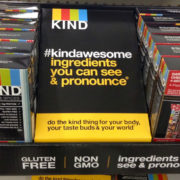PASSION OR POISON: THE HORROR OF HUBRIS
Brand founders are special. They have great ideas. And, they have passion. They act on their ideas. Brand founders have the code of the brand in their core. It is always worthwhile to spend time listening to their stories, learning from where the brand’s values come, and understanding the brand’s guiding principles. Unfortunately, sometimes a brand founder’s passion becomes arrogance; poison for the health of the brand. Uber is a recent example of passion turning into the poison of arrogance. And, sadly, another recent example is Chipotle.
Recent UBS research indicates that the customer perceptions about Chipotle have fallen enough to merit downgrading Chipotle’s rating from neutral to sell. The research indicates that concerns about food safety are only the tip of the iceberg. Customers indicate that they frequent the brand less not only because of food safety but also because customers perceive the brand as not as clean as it used to be; the food is not as good as it used to be; the service is slower than it used to be; its food is not healthy; and friends do not want to go there with me. Whether these statements are actually true, perceptions are everything: the hovering food safety issues have tainted customers’ overall brand perceptions. UBS examined Chipotle’s online ratings across various websites: the brand’s online ratings – reflecting customer reviews – have deteriorated substantially.
Chipotle was built on the brand founder’s commitment to sourcing and preparing food according to classical culinary techniques applied to fast food. His passion for Chipotle’s founding principles worked when the brand was small. However, Chipotle has grown to over 2000 restaurants. It now needs to operate differently. Yet, Chipotle did not adapt. Classical cooking does not work for a 2000 restaurant chain. Food safety was a looming risk. The founder’s passion actually prevented the brand from handling an incredibly serious food safety situation where customers in multiple states were becoming ill. The brand founder’s unwavering belief in the food’s provenance and the logistical and culinary processes became stumbling blocks. The food could not be the problem: the food is organically, naturally, humanely grown, nurtured, handled, and the food is additive-free.
Chipotle’s commitment to classical culinary techniques meant crewmembers had to learn how to properly use knives, and all preparation would be handled in the restaurant, just as in high-end, sit-down, restaurants. Chipotle does not use frozen food. Rice and guacamole are made fresh every day in the restaurant.
The public communications reflected the founder’s hubris. Over the course of the multiple food safety incidents, the brand released numerous press statements that boggled the mind. There was a statement indicating that along with Food with Integrity, Chipotle was now committed to food safety. Did they mean that previously the idea of integrity did not include food safety? Chipotle hired a food safety expert, but there have been no indications that this expert’s recommendations have been followed. In fact, after using a commissary to safely prepare the food the brand’s founder thought the food tasted differently and so the commissary preparation was stopped.
Chipotle seemed to view the food contamination issue as a small, limited standalone issue. They did not imagine that overall brand imagery perceptions across the brand would be damaged. Contaminated food appears to affect the image of restaurant cleanliness, food taste, and customer service.
Chipotle felt the media treated them unfairly. The incidents were only a very small fraction of the total number of customers served very day. But, the credibility of Chipotle’s promise of “food with integrity” was attacked at its core by these incidents. Playing the situation down will not make it go away.
Advertising can do many things, but it cannot make a restaurant’s food safer. Chipotle tried strange, unconventional adverting. Product safety issues cannot be changed by running a philosophically existential advertising campaign that is probably making Jean Paul Sartre turn over in his grave.
New products did not help change the perceptions of Chipotle either. Chipotle’s queso has been ferociously panned. Commitment to the founding principles of classical culinary techniques does not work for preparing queso as people know it. Chipotle tries a new dessert item. This was destined to fail. People come to a restaurant for its core menu. They are not likely to choose chipotle for a dessert if they do not like the burritos. The dessert entry has been yanked from the stores. And,
Chipotle is not a franchise. Chipotle owns all the restaurants. There was no interest in having outsiders meddling in the brand. As Chipotle grew to over 2000 restaurants, the management of the brand became much more complex. Furthermore, the creation of two other restaurant brands using the Chipotle-style assembly line distracted executives.
Chipotle has experienced tremendous success. The brand changed the fast food landscape. Chipotle leapt to success by leveraging an idea that food can be great and fast. The problem fast food is not that the service was fast; it was the food. Offering quality, sustainably sourced food, made in the restaurant according to classical culinary techniques was something new for the fast food customer. Chipotle’s success created a new business model the industry dubbed fast casual.
Success needs to be leveraged, not lived off. As brands grow, as the world changes, as customers change, properly managing brands demands changing the way the brand experience is delivered. The essence of the brand’s promise can be kept intact while adapting to changing circumstances.
Chipotle is now looking for a new CEO. As with Uber, Chipotle needs a new leader to put the brand back together. The belief that stubbornly sticking to original techniques supported by unusual advertising would bring back customers and allay their fears was arrogant.
Chipotle is on a downward spiral. Executive hubris will not change this trajectory. Yet, the death of the Chipotle brand is not inevitable. Brands can live forever if they are properly managed.






